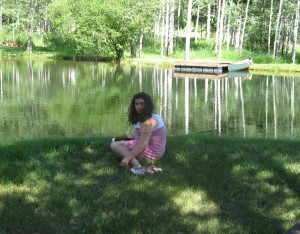We have spared no expense in securing the services of an ace guest blogger this week while we recuperate from our thirtieth college reunion in Massachusetts. Below, Thea Kohout offers some reflections on the importance, and scarcity, of stillness.
I know that there have already been several posts on this blog about my grandmother Jessica Hobby Catto (who insisted that we all call her Tia, which means “aunt” in Spanish, since she was far too young to be a grandmother), but I’m going to talk about her again because she was one of the smartest people I ever met, and she gave me some of the best advice I’ve ever received.
A few months before Tia died, my mom and I were up in Colorado visiting her and the rest of my mom’s family. On this day, Tia had had a rough morning and was in bed resting when we came by. By that point, she was already visibly a very sick woman, and it was hard for me to see her like that because for my entire life, she had been a larger-than-life matriarchal presence, perpetually strong and in charge. But now she was thinner, quieter, more brittle, and I could see her chemo port, hard and unforgiving, pushing against the fragile skin of her chest.
I had been wandering around the house and yard as she and my mom talked, running my hands over the familiar tchotchkes and books I had grown up with, when Tia called me back to her bedroom. She was sitting up in bed waiting for me and patted the spot on the bed next to her, so I hopped up. This was the summer before my senior year of high school and I was jittery and restless about my imminent “adulthood.” She asked me what I was going to be doing for the rest of the summer and I rattled off my list of daily musical rehearsals, college applications, summer reading, essays, choir practices, etc. She stared at me and then said, “You know what your problem is?” Taken aback, I shook my head, unaware that I had a problem. “You don’t know how to be still. You don’t know how to not be constantly doing something. And it’s important that you know how to do that.”
This was one of our last one-on-one conversations, and in the chaos that followed her death that fall, I kept coming back to it, because it finally started to make sense.
Our world is one of fast-paced, fast-talking progress. We’re told we need technology, urbanization, corporations, government participation in everything. Everything is in constant forward motion and I get it: productivity comes from hard, dedicated work. But I can’t help noticing that a lot of people seem to be missing something, and I think that what Tia told me is it: somewhere, we lost the capacity for reflection and quietness. Jean de La Bruyère once said that all of our unhappiness comes from our inability to be alone, and I think he is totally right. Which is why I think what my parents are doing at Madroño Ranch is so important: it gives you a chance to be still.
I’m nineteen years old. Madroño Ranch became a part of our lives when I was a year old, so I’ve been coming out here since before I can remember for Thanksgiving, New Year’s, summer, birthdays, long weekends, and various and sundry other events. As I’ve grown and as Madroño’s purpose in our lives has evolved, so have my perceptions of the place. When I was little, going out to the ranch was only fun if I had siblings or friends or cousins coming with me to swim with me, jump on the trampoline with me, play in the treehouse with me, and sleep in the bunkroom with me. Going out with just my parents was boring and while I appreciated having a place to go when I got tired of being in a city, I avoided going without guests.
With my grandmother’s wise words, however, came a change. Madroño began to teach me how to be still and how to be by myself among its quiet caliche roads, its shallow creeks and fairy waterfalls, its birds and butterflies, its wide blue skies. I’ve always thought the Hill Country was pleasant, but with this newfound knowledge I began to see its real beauty. I think of myself as an extremist; I like everything to be at one pole or the other. This explains my love of the Rocky Mountains in Colorado (there is absolutely nothing subtle about their soaring, staggering, jagged, heart-catching splendor), and also why I prefer Beethoven to Bach and Kahlo to Bouguereau. Spending time in solitude out at Madroño has gotten me to realize that beauty can be found in the tiniest things, like dewdrops on tiny purple flowers growing between cracks in rock, or the way sunlight seems to shatter and spark on the surface of a lake, or a birdsong wavering through gray-purple fog on a winter morning.
It’s easy to forget how important it is to put aside time to reflect. The rise of cell phones, email, social networking sites, and even the push to live in urban and suburban areas has gradually instilled in us a fear of being alone. We’re all hyper-connected to people all over the globe and, yes, it’s incredible that we can stay in contact with people we love so easily, but it’s just as incredible to be temporarily unplugged from all that. With this kind of reflection comes inspiration, and with inspiration comes true progress. The word inspiration literally means the act of breathing in, and I can’t think of a more perfect place to inspire than out in nature, alone and breathing.
What we’re reading
Heather: Gary Snyder, A Place in Space: Ethics, Aesthetics, and Watersheds
Martin: Lewis Hyde, The Gift: Creativity and the Artist in the Modern World


Thea, this is lovely. How lucky you are to have such an amazing Tia! As I have aged (I graduated from college with your parents), my overarching motto has become “Do nothing, then rest afterwards.” I rarely make it all the way out to the extremes of that motto, but at the very least, it serves to remind me to slow down, and sometimes even stop altogether. Thank you for yet another lovely reminder.
Well put Thea. Doing nothing comes in handy–just be sure to marry a “do-er”!
This blogger was not paid nearly enough! Thea, this is a lovely piece – thank you!
Lovely, Thea. I’m reveling in Beethoven as I type this. One of my favorite expressions of recent years is a wise twist on an old adage: “Don’t just do something—Sit there!”
Thea, what a special gift your Tia provided to you that led you to this realization far sooner in life than most of us have. Advice not always easy to follow, but having the understanding at your young age will always lead you back to that place. Very well written, to boot. Thank you for sharing your thoughts.
Give this guest blogger a raise (or whatever it takes to get another post out of her)! Brava, Thea.
Nice one, Thea! I’m sending it to Sophie at camp where there might just be a still moment or two (not!) Anyway, we’re starting to collect Family Stories and this is a great one for the archive. Cheers to you for a great summer!
Wise words, wise girl! Thank you for this beautiful , thoughtful and inspirational post. Yes, inspirational! This old lady is going to stop, take that deep breath, and just do nothing for a little while. Thanks for that, Thea!
Great article Thea. And it is not just because we are your proud grandparents. Now, speaking as your grandfather, I second your grandmother’s (Tia) remarks about taking time to just do nothing. Maybe it’s laziness or maybe it is because as your Dad said in that nice birthday blog about me, I’m glad not to have all the things he mentioned and I really enjoy my way of life.
Thea – Thank you for a wise and graceful piece. I look forward to reading more of your blogs.